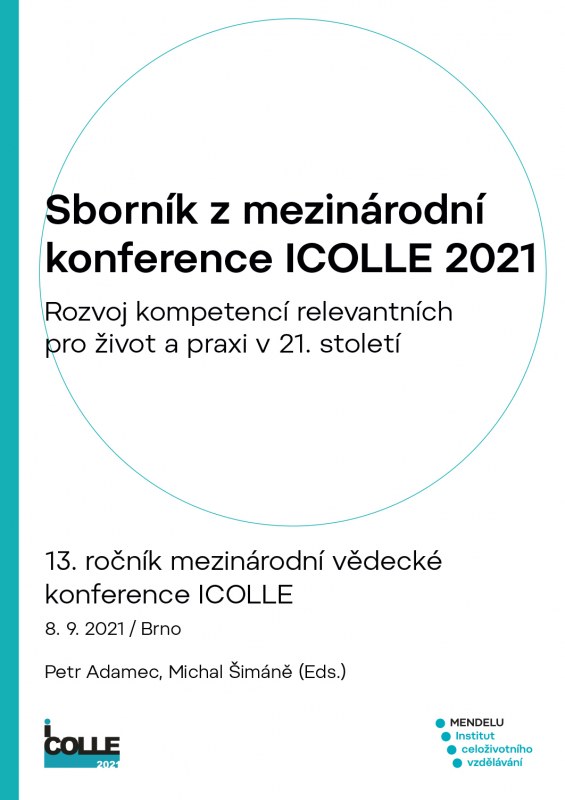
DOI: 10.11118/978-80-7509-832-0-0190
ASPEKTY ROZVOJE TECHNICKÉHO MYŠLENÍ V NÁVAZNOSTI NA ROZVOJ DIGITÁLNÍ GRAMOTNOSTI U BUDOUCÍCH UČITELŮ
- Čestmír Serafín
The paper deals with analysing the possible development of the technical aspects of thinking and how they are influenced by, or supported by, or what patterns are evident in this area along with the development of digital literacy. Currently, the question of literacy has become quite a major social phenomenon that is developing along with the development of the company. Surely each one of us remembers the original meaning of the word literacy‑skill to read, write and count. These skills in the history of mankind didn’t exist and up to about 15th century was mainly the prerogative of the elite of the society. Today the situation is different in most of the world, and the literacy rate is actually an indicator of cultural maturity of the company. Thus, if we deal with the concept of digital literacy, the term that has become a phenomenon of our time technologically advanced society, here we see the link between the technical thinking, technical literacy (in this case, technological literacy) and digital literacy.
Keywords: technical education, technical thinking, digital literacy, teacher training, pedagogy, subject didactics
pages: 190-199, online: 2022
References
- Ala-Mutka, K. (2011). Mapping Digital Competence: Towards a Conceptual Understanding.European Union, Seville. Dostupné z: http://www.dctest.org/uploads/6/8/7/0/68701431/jrc67075_tn.pdf
- Autio O. & Hansen, R. (2002). Defining and Measuring Technical Thinking: Students' Technical Abilities in Finnish Comprehensive Schools. Journal of Technology Education, 14(1).
 Go to original source...
Go to original source... - Bauman, P. (2013). Kritické a tvořivé myšlení: není to málo?: rozvoj myšlení ve filosofických, teologických, psychologických a pedagogických souvislostech. České Budějovice: Teologická fakulta Jihočeské univerzity v Českých Budějovicích, Centrum filozofie pro děti.
- Bertrand, Y. (1998). Soudobé teorie vzdělávání. Praha: Portál.
- Částková P., Kropáč, J. & Plischke, J. (2016). Přínos informálního a neformálního vzdělávání pro technické vzdělávání žáků základní školy. Journal of Technology and Information Education, 8(2).
 Go to original source...
Go to original source... - Ferrari, A. (2012). Digital Competence in Practice: An Analysis of Frameworks. Seville: European Commission. Joint Research Centre. Institute for Prospective Technological Studies. Dostupné z: http://ftp.jrc.es/EURdoc/JRC68116.pdf
- Ferrari, A. (2013). DIGCOMP: a framework for developing and understanding digital competence in europe.Seville: European Commission. Joint Research. Centre Institute for Prospective Technological Studies. Dostupné z: http://bit.ly/1pm1qya
- Franus, E. (2003). The Dual Nature of Technical Thinking. In Technology as a challenge for school curricula. Stockholm: Institut of Education Press.
- Gilster P. (1997). Digital Literacy. New York: John Wiley & Sons, Inc.
- Havelka, M. & Kropáč, J. (2017) Technologie, myšlení o technologii. Olomouc: Univerzita Palackého v Olomouci.
- Chaudron, S. et al. (2015) Young children (0-8) and digital technology: A qualitative exploratory study across seven countries. JRC 93239/EUR 27052. Dostupné z: https://bit.ly/2veskYo
- Chráska, M. (2016) Metody pedagogického výzkumu: základy kvantitativního výzkumu. Praha: Grada.
- Krušpán, I. (1985) Rozvíjanie technického tvorivého myslenia v procese technickej záujmovej činnosti. In: Rozvíjanie tvorivých činností v pracovnej výchove. Banská Bystrica: Pedagogická fakulta.
- Mareš, J. (2013). Pedagogická psychologie. Praha: Portál.
- Martin, A. (2008). Digital Literacy and the "Digital Society". In: C. Lankshear & M. Knobel (Eds.), Digital Literacies: Concepts, Policies, and Practices. New York: Peter Lang.
- Neumajer, O. (2017). Být digitálně gramotný už neznamená jen ovládat počítač. Řízení školy, 14(3), 28-31.
- Průcha, J., Walterová, E. & Mareš, J. (2013). Pedagogický slovník. Praha: Portál.
- Růžičková, D. (2011). Rozvíjíme ICT gramotnost žáků. Praha: Národní ústav pro vzdělávání, školské poradenské zařízení a zařízení pro další vzdělávání pedagogických pracovníků (NÚV), divize VÚP.
- Škára, I. (1993) Úvod do teorie technického vzdělávání a technické výchovy žáků základní školy. Brno: Masarykova univerzita v Brně.
- Škoda, J. & Doulík., P. (2009). Dětská pojetí" teoretická východiska a metodologické aspekty. In: Výzkum výuky: tematické oblasti, výzkumné přístupy a metody. Brno: Paido.
- Vaníček, J. & Černochová, M. (2015). Didaktika informatiky na startu. In: Stuchlíková, I., Janík, T. et al. (eds.), Oborové didaktiky: vývoj - stav - perspektivy. Brno: Munipress.


